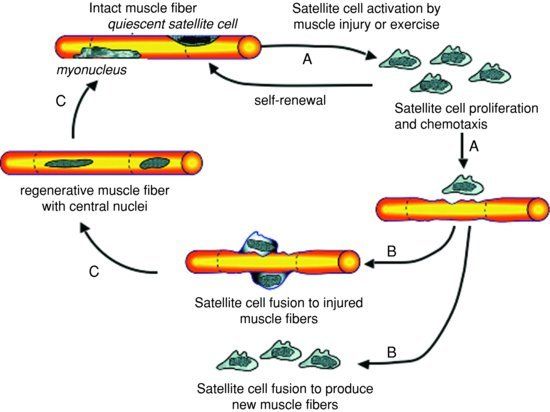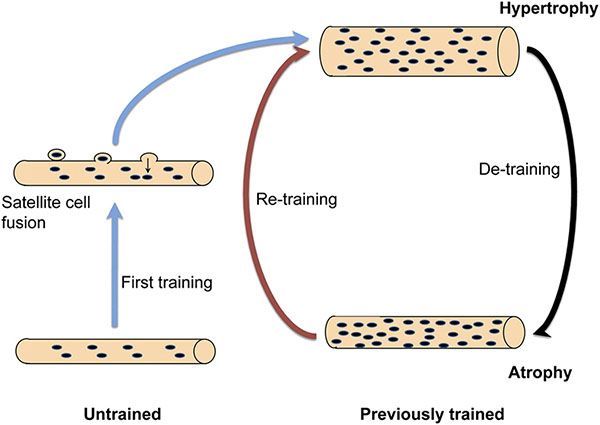If you’ve spoken to enough bro’s at the gym, I’m gonna bet you’ve heard one of them mention something about muscle memory at some point. Although it’s not quite what it sounds like, your muscles do have the ability to regain size and strength a lot faster the second (third, fourth.. etc.) time around. Your muscles don’t have a brain and they can’t recall ever being something, but with each time your muscles increase in size, they lay down the foundation for accelerated growth via an increase in the number of nuclei their cells contain; this is how the muscles have a form of 'memory'.
Satellite Cells - The Muscle's Form of Memory
Muscle memory all begins with the number of nuclei a muscle cell contains. Muscle cells are special in that, unlike most other cells, they contain more than one nucleus. Every cell has at least one nucleus and it is what provides everything needed for the tissue to grow and be maintained. Because muscles are extremely large – up to 5 times larger than other types of cells (2) – they cannot grow unless they have more nuclei present to support a given amount of muscle tissue (1,2).
Even though muscles are already multinucleated, to begin with, the present nuclei cannot drive enough muscle protein synthesis (MPS) to create and maintain the amount of muscle tissue necessary. To obtain the number of nuclei necessary, they rely on what is known as satellite cells, which are located just outside of the muscle cell, to donate their nuclei to the muscle cell.

Illustration 1: Taken from Tidball (2011). (3)
An Increased Ability to Regain Muscle Size
Unlike other tissue in the body, the additional nuclei that are added during the process of hypertrophy (growth) are not lost when training stops and the muscle starts to atrophy (decrease in size). Instead, the muscle reduces in size but now has a greater density of nuclei per muscle cell than it did beforehand (i.e., more nuclei per volume of muscle tissue) (2). This increase in nuclei density has great advantages when training discontinues and forms what is considered the muscles 'memory'.

Illustration 2: Taken from Bruusgaard et al., (2010). (2)
A person who has gained muscle then stopped training and lost a lot of that muscle, will still have a greater density of nuclei per muscle cell. This means that when they recommence training, their muscles can skip an entire step of the process by not having to recruit satellite cells. Not only that, but the muscle cell's power to drive MPS is far greater due to containing more nuclei per volume of muscle tissue compared to the first time. All-in-all, this results in the muscles ability to regain its lost size far greater and has been shown to take as little as a third of the time (4)!
An Increased Ability to Regain Strength and Power
This accelerated regain in muscle size not only benefits those interested in improving their body shape and appearance, but also those concerned with regaining their strength and power. Strength is the ability to produce greater force and power is a function of force and speed. Improving force production depends on several factors, including:
- neural adaptations (increased muscle recruitment, improved neural firing rates, coordination of muscle activation, etc.),
- a reduction in inhibitory mechanisms (from Golgi tendon organs), and
- improvements in structural elements (muscle size, muscle architecture, connective tissue, etc.) (5). A bigger muscle has the potential to produce more force. Therefore, muscle size is an important factor in strength and power development, especially as you become more experienced, and your previous muscle size would have highly contributed to your strength and power ability. Neural adaptations that help to improve strength and power tend to occur well before muscle hypertrophy does (6). Therefore, It's likely the contributing factor that will take the longest to regain and would be the main determinant of just how long it takes to regain your previous strength and power. However, thanks to muscle memory, regaining that lost muscle size will occur a lot faster than it did to gain it in the first place.
Conclusion
If you’re forced to take time away from training, it’s not all bad news – you can regain your size, strength and power faster than what it took to gain it in the first place. Thanks to the fact muscles don’t lose the nuclei they gain during growth, muscles have a form of ‘memory’ that accelerates the regain of lost muscle. Although it’s tough to lose some of your hard-earned gains, it’s reassuring to know that it won’t take anywhere as much time in the gym to recoup them.
##References
- Egner, I. M., Bruusgaard, J. C., & Gundersen, K. (2016). Satellite cell depletion prevents fiber hypertrophy in skeletal muscle. Development, 143(16), 2898–2906. doi: 10.1242/dev.134411
- Bruusgaard, J. C., Johansen, I. B., Egner, I. M., Rana, Z. A., & Gundersen, K. (2010). Myonuclei acquired by overload exercise precede hypertrophy and are not lost on detraining. Proceedings of the National Academy of Sciences, 107(34), 15111–15116. doi: 10.1073/pnas.0913935107
- Tidball, J. G. (2011). Mechanisms of Muscle Injury, Repair, and Regeneration. Comprehensive Physiology. doi: 10.1002/cphy.c100092
- Staron, R. S., Leonardi, M. J., Karapondo, D. L., Malicky, E. S., Falkel, J. E., Hagerman, F. C., & Hikida, R. S. (1991). Strength and skeletal muscle adaptations in heavy-resistance-trained women after detraining and retraining. Journal of Applied Physiology, 70(2), 631–640. doi: 10.1152/jappl.1991.70.2.631
- Haff, G., & Triplett, N. T. (2016). Essentials of strength training and conditioning. Champaign, IL: Human Kinetics.
- Sale, D. G. (1988). Neural adaptation to resistance training. Medicine & Science in Sports & Exercise, 20(Sup 1). doi: 10.1249/00005768-198810001-00009












